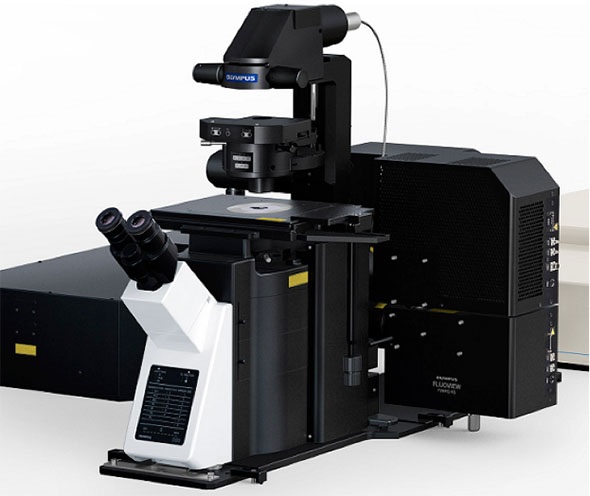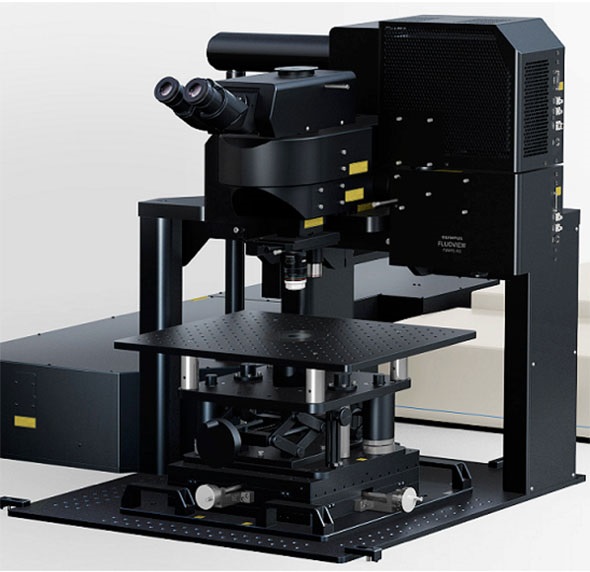Olympus FLUOVIEW FVMPE-RS Multiphoton Microscope Series Adds Two New Systems for Imaging Deep, Rapidly Changing Biological Specimens Olympus has announced the release of two new configurations in its FLUOVIEW® FVMPE-RS multiphoton laser scanning microscope series -- a Gantry microscope system and an inverted microscope system.
The flagship offering in the full range of Olympus biological microscopes, the FLUOVIEW FVMPE-RS series is used in life science research. Its high-speed scanner allows observation of ultra-rapid biological responses, and it can obtain vivid images from as deep as 8mm below the tissue surface. The two new models expand the FLUOVIEW FVMPE-RS series beyond the original upright microscope version introduced in 2013 to offer even greater scope and flexibility for research. The new systems also open up a wide range of observation possibilities suited to imaging a greater variety of biological specimens.

The Gantry microscope model features an ultra-stable arch-like structure that allows considerable space beneath the objective to accommodate samples of varied sizes. A volume 640mm wide, 355mm high and 520mm deep is available if the stage is removed, providing the system with sufficient space for the researcher’s own experimental apparatus and providing flexibility to suit different observation purposes.
The inverted microscope system is ideal for observation of cells in three-dimensional (3D) cultures, where multiple layers of cells are cultured in a petri dish or similar vessel. Because inverted microscopes allow the researcher to observe the sample from below, this configuration is optimized for 3D-culture imaging and allows cells that have adhered to the base of the petri dish to be observed without culture fluid touching the objective.
For more information about the three systems in the FLUOVIEW FVMPE-RS multiphoton microscope series, contact Yiwei Jia, Ph.D., Olympus Scientific Solutions Americas, at [email protected], or visit www.olympus-lifescience.com.

Launch Background
Multiphoton imaging is a microscope research technique used in the life sciences to elucidate the role and function of proteins or nerves, and to seek out important data related to drug discovery. In the case of cerebral nerves, for instance, scientists need to observe biological responses at sites far below the tissue surface, both to elucidate the nerve mechanism and to develop therapeutic drugs or other treatments for diseases such as cancer or Alzheimer’s. Relying on Olympus’s renowned optical and digital technologies, the FLUOVIEW FVMPE-RS multiphoton laser-scanning microscope system meets the needs of researchers by helping them capture images and movies of rapid biological responses deep within samples. Because researchers requested support for a wider range of applications and specimens, Olympus has now added Gantry and inverted systems to supplement the original upright system.
About Olympus
Olympus Corporation is an international precision technology leader operating in industrial, medical, academic and consumer markets, specializing in optics, electronics, and precision engineering. As a subsidiary of Olympus Corporation, Olympus Scientific Solutions Americas is an integral part of the global Olympus network with specific responsibility for the sales and marketing of life science and industrial instrumentation in the Americas. The company’s core product lineup comprises clinical, educational, and research microscopes, nondestructive testing equipment, and analytical instruments all designed with the unwavering commitment to enhancing people’s lives every day and contributing to the safety, security, quality, and productivity of society. For more information, visit www.olympusamerica.com.